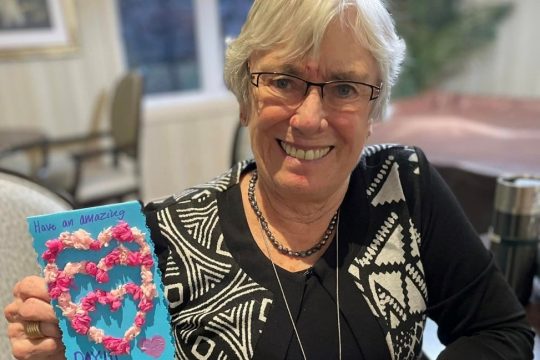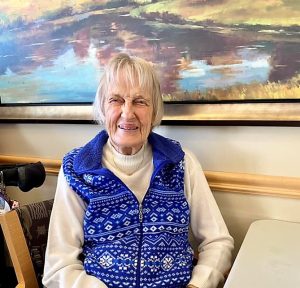
Winter in Canada conjures many feel-good images. Beautiful white landscapes. Icicles shining on a bright winter day. Children playing ice hockey on a frozen pond. However, as the cold days continue to roll across the country, a seasonal melancholy can settle in along with the snow.
Whether it’s due to the cold temperatures, shorter days, the holidays coming to an end, or reminders of missed loved ones, this seasonal sadness can make it hard for older adults to maintain a happy, healthy mindset.
Luckily, there are some ways to bring the spring back into your step.
Winter Blues or Seasonal Affective Disorder
 According to the Canadian Mental Health Association, about 15% of the general population experience “the winter blues”. A generalized term rather than a medical diagnosis, the winter blues is fairly common and mild in nature. You may feel a change in appetite and feelings of sluggishness that creep in during the winter months.
According to the Canadian Mental Health Association, about 15% of the general population experience “the winter blues”. A generalized term rather than a medical diagnosis, the winter blues is fairly common and mild in nature. You may feel a change in appetite and feelings of sluggishness that creep in during the winter months.
Seasonal affective disorder, though, is a different story. It’s a well-defined clinical diagnosis that affects about 2–3 % of the population. Often brushed aside as “just” the winter blues or “just” being in a bad mood, SAD is more than simply feeling a bit down at the passing of summer.
Seasonal Affective Disorder (SAD) is a type of depression that follows a seasonal pattern. According to the National Institutes of Health (NIH) in Bethesda, Maryland, shorter days seem to be the main trigger for SAD. The defining symptom is a sad, despairing mood that is present on most days, and continues for more than two weeks.
SAD symptoms include the above winter blues symptoms, as well as:
- Inability to concentrate
- Irritability
- Loss of interest in normal activities
- Feelings of sadness or despair
- Lack of motivation
- Change in sleep habits
- Craving sugary and starchy foods
- Weight gain
If you’re experiencing frequent negative feelings, please ask your doctor or care provider for help.
How To Beat the Winter Blues and SAD
While the dark and cold winter months can make anyone feel glum, older adults and those with dementia are especially at risk. With a few precautions however, you can stay happy and healthy through the frigid times ahead. Follow these 5 tips to beat SAD and the blues.
1. Let in the Light
First and foremost, make a plan to get outside during the short hours of sun. Sunshine is vital to feeling healthy and happy. Direct sunlight provides us with Vitamin D, which boosts the immune system, improves bone health, and regulates mood.
On days when it’s too cold to go outside, keep your curtains open and spend as much time as you can near the windows. Even if it’s cloudy, getting some daylight can help you feel better.
All Seniors Care retirement communities are planned around accessibility to beautiful parks, nature trails, and walkways. You can find some beautiful walking routes at our senior homes in Ottawa, Gatineau, Winnipeg, Edmonton and more.
2. Let’s Get Physical
 Regular exercise is one of the best things you can do to keep the blues and SAD symptoms at bay. A natural mood enhancer, even short periods of exercise can work wonders. It supports overall cognitive function and increases the number of feel-good neurotransmitters released by the brain.
Regular exercise is one of the best things you can do to keep the blues and SAD symptoms at bay. A natural mood enhancer, even short periods of exercise can work wonders. It supports overall cognitive function and increases the number of feel-good neurotransmitters released by the brain.
Moderate exercise such as walking, riding a stationary bike, or swimming are a great way to get started. But any activity that raises your heart rate—including daily chores—can help, especially if you can do them outdoors or near a sunny window.
Favourites at ASC retirement communities are workouts like Tai Chi, yoga and dance lessons. With designated exercise areas, pools, as well as activity calendars filled with options for group classes, it’s easy to stay physically active.
3. Stay Socially Engaged
You might not feel like a social butterfly at the moment, but seniors who remain socially connected also report having better mental health. So, make it a goal to keep up with social activities by joining in on workshops, exercise classes and events. Other ways to stay connected this winter are to up a call or FaceTime with a loved one or send out a letter.
Check-in with activity staff to see what events are planned in the coming weeks. There is always something exciting on the horizon at All Seniors Care!
4. Get Into the Right Mindset
Scandinavian nations, such as Denmark, which endure some of the longest and bleakest winters on the planet, embrace the concept of hygge. The idea is to get cozy and spend time inside with friends and family. Create a sensory kind of pleasantness in your space.
How? Look for ways to bring things into your environment that will counteract the dullness of winter.
- Treat yourself to fresh flowers.
- Listen to music you love.
- Elevate your mood with tactile experiences like touching something soft, like a blanket or scarf.
- Nurture your spirit with a good book or gratitude journal.
- Or experiment with essential oils. Citrus scents, like grapefruit and tangerine, are great for positive mood boosting.
5. Maintain a Healthy Diet
 We’ve all felt the allure of “comfort food” during fall and winter−pumpkin spice, apple crisp, chicken pot pie, chili or mac and cheese. To make matters worse, SAD is associated with increased cravings for carbohydrates. The problem with many comfort food favourites is that they tend to be on the fattier side, and often loaded with carbs and sugar.
We’ve all felt the allure of “comfort food” during fall and winter−pumpkin spice, apple crisp, chicken pot pie, chili or mac and cheese. To make matters worse, SAD is associated with increased cravings for carbohydrates. The problem with many comfort food favourites is that they tend to be on the fattier side, and often loaded with carbs and sugar.
While there’s no harm in indulging in the occasional treat, a healthy diet can ward off the blues by keeping you energized. So, make sure that vitamin and mineral rich fruits and vegetables are well represented in your diet. You can check out the types of food that help combat SAD here.
Each of the All Seniors Care retirement residences offers a variety of dining options to meet your needs. Meals are not only delicious, but dietician-approved! With selections to fit a wide range of medical needs and tastes, maintaining a healthy diet is easy. Residences like those at Chapel Hill in Ottawa provide full dining service and private dining rooms when you have family and friends visit.
For more Senior Living Advice and health tips explore our blog.
Writer – Julianna McLeod
Julianna is a health and wellness expert at All Seniors Care. Her mission is to create content that empowers seniors to form sustainable solutions for lasting health and happiness. She is an experienced writer, editor, and Recreational Therapist living in Toronto.